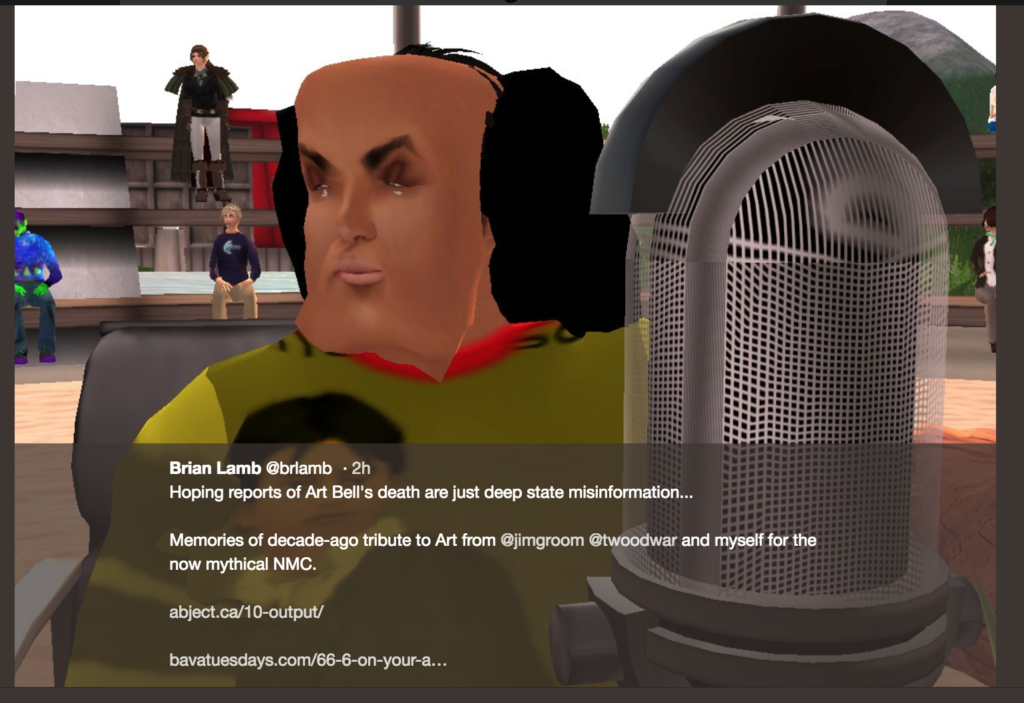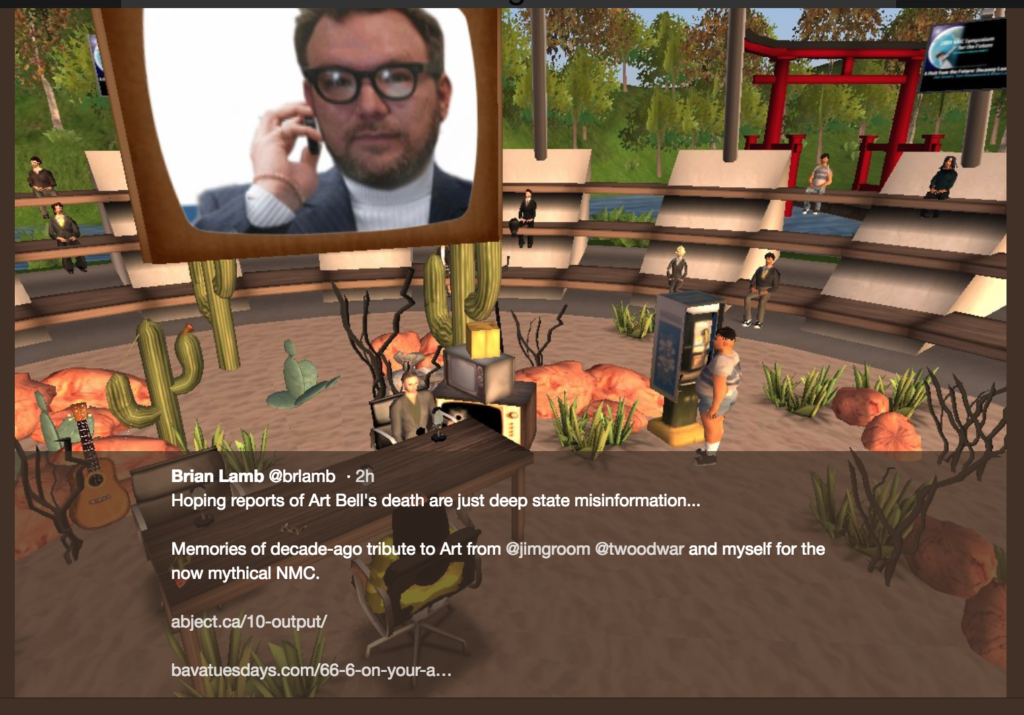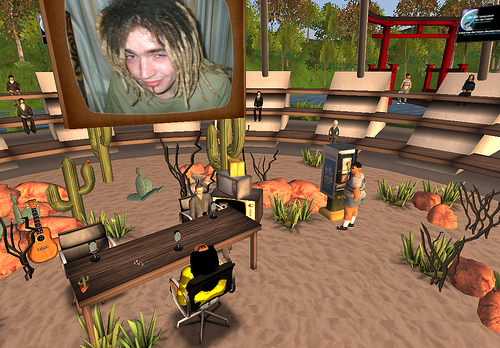It’s funny how things align, just the other day Tom and I were chatting about some old presentations, particularly the Ed-Tech Survivalist’s “swamp of knowledge,” and I was thinking this is very much inline with my best memories of talking about EdTech. Then, with the news of radio legend Art Bell’s passing, Brian Lamb tweeted about a presentation we did together with Tom Woodward in 2009 that was using an Art Bell-inspired, conspiracy-laden radio show as its motif. The idea was simple: the radio host’s guest is a time traveller from the future who turns out to be selling education insurance to those poor saps from the past. I blogged it back in November of 2009, and it it one of the several presentations we did for NMC that were pretty outlandish, bordering on bad performance art. It was when Alan Levine and Rachel Smith were running the Second Life conferences, and it retrospect they were pretty wild. I mean look at the screenshots below….



A radio show being broadcast from Second Life with a virtual TV monitor representing the Education insurance salesman from the future—as well as the random callers. What’s more, all framed within a sandy, cactus-filled arena that happens to have an old-school pay phone—that’s pretty bizarre. I never thought I would be looking back on Second Life fondly, but there you have it—the passing of time truly warps one’s perception of what was. And the audio is pure gold, trust me 🙂
I listened to the talk again this morning after almost 9 years, and I was struck by a couple of things. First and foremost how awesome the frame Brian Lamb came up with for the whole thing. His fandom for Art Bell paid dividends, and couching the whole thing as a edtech conspiracy radio show was perfect, and his intro and outro set the stage brilliantly.* Additionally, Tom’s whole idea of couching the episode around an education insurance salesman was a really smart way to get at a bunch of issues of the day: the privatization of education; the rhetoric of disruption; the empty promises of open; the danger of massive scaling; the militarization of schools; the insanity of educational costs and access; etc. He scripted most of the key points there, and they hold up surprisingly well.
In fact, it is a good reminder for me that while playful and experimental, it was a pretty trenchant critique of the way in which we were off-loading education to the corporate harbingers of Web 2.0 in the name of convenience and “free.” The conceit was pretty simple: you’ll have to pay sooner or later for the deal with the devil given the ways things will go in the future—so it’s high time to buy education insurance. The funnest part of the presentation for me was constantly returning the conversation back to the fears and needs of the callers: “you invested a lot in your mind, doesn’t it make sense to protect that valuable resource you spent so much money on?” —which then becomes a seamless segueway for yet another pitch for education insurance. I loved that. I was personally convinced of the value of educational insurance by the end of the talk. And when you realize the insanity of the US system that burdens students with student loan debt as high as six figures—none of it seems comical. In fact, the student debt crisis is still hanging over our head, and we still have our heads in the sand about it—and neither MOOCs nor OERs are nearly enough to save us from it.
In terms of alignment, yesterday I invited by Jeff Nugent to talk to the educational technology folks at Colgate yesterday wherein I re-visited some of the practical innovations I was a part of at UMW: the Bluehost experiment, UMW Blogs, ds106, Domains, etc. And one of the things I came away with from that talk was that there was a counter cultural ethos to the ways things were being done more broadly in ed-tech, and that was often linked to blogging and personal spaces on the web. We wanted faculty and students to own their work, and by extension their data, and we wanted that work to be connected in some real ways to both the web and the institutions we supported. So rather than the great purging of personal university webspace and re-branding efforts of Web Communication departments that gentrified the EDU web, we kept alive the spirit of the university as a space where the personal web mattered and was valued. Not sure if this is just more retrospective self-congratulation on my part—it very well could be, and I certainly have a unique tolerance for such reasoning—but it does resist my own tendency to remember that everyone in ed-tech from 2004-2016 was simply caught up uncritically in the social media orgy that was Web 2.0.
Anyway, special thanks to Brian for posting the audio on the Abject, something that I would have given up for lost given the NMC site has been shuttered. But then again, once he posted it, Alan is suggesting he might even have the video—and I am loving the Second Life aesthetic these days:
I might have a video archive in a drive at home…
— Alan has x-ed to @cogdog (@cogdog) April 14, 2018
I still love the blog-based web.
*Also interesting that it is a radio show given what’s to come in 2011 with ds106radio.


“This ain’t 2009, hippie.”
Good to know our presentations are still unsaleable 9 years later 🙂
“When you were young and your heart was an open book . . . “
And now…
“Live and let die.”
Although the zombie apocalypse did not occur in 2012 (as much as I am aware), many of these futures sadly seemingly are coming into fruition. From net neutrality to Web 2.0, many ‘promises’ have failed. One highlight was the mention of Wordle. The uncanny aspect is that it feels like a conversation that is needed today as much as ten years ago.
Syndicated at Read Write Collect
Viva Art Bell!
In March someone asked me to do a presentation in Second Life. What a weird experience.
Did you do it? What is it like? You should do a presentation about “dead” technologies and their aftermath in Second Life. Would be fun.
I’d like to. Time’s a question.
SL is still damned awkward to use. There was a *team* helping me this time, and still problems arose.
I didn’t have time to explore the weird stuff people built. So much is unchanged.
A second life seance for over-hyped ed tech ghosts.
I would be game for that.
The hard part would be getting anyone to sign in.
And, once signed in, making the thing work.
make it pay-per-view with a long click through ToS … https://abcnews.go.com/GMA/story?id=125322&page=1
Pingback: Hollywood Squares at MEITAL2020 | bavatuesdays